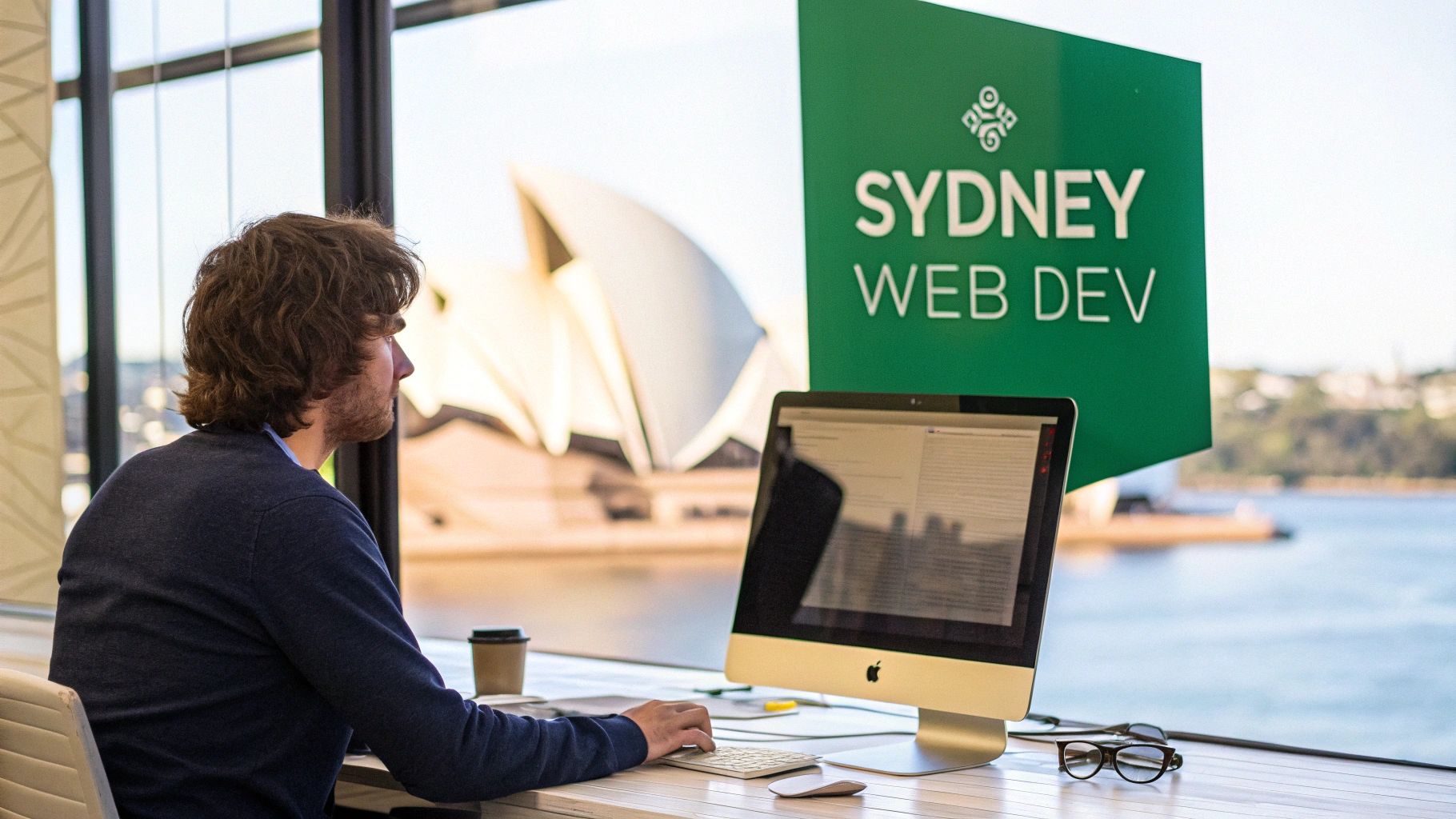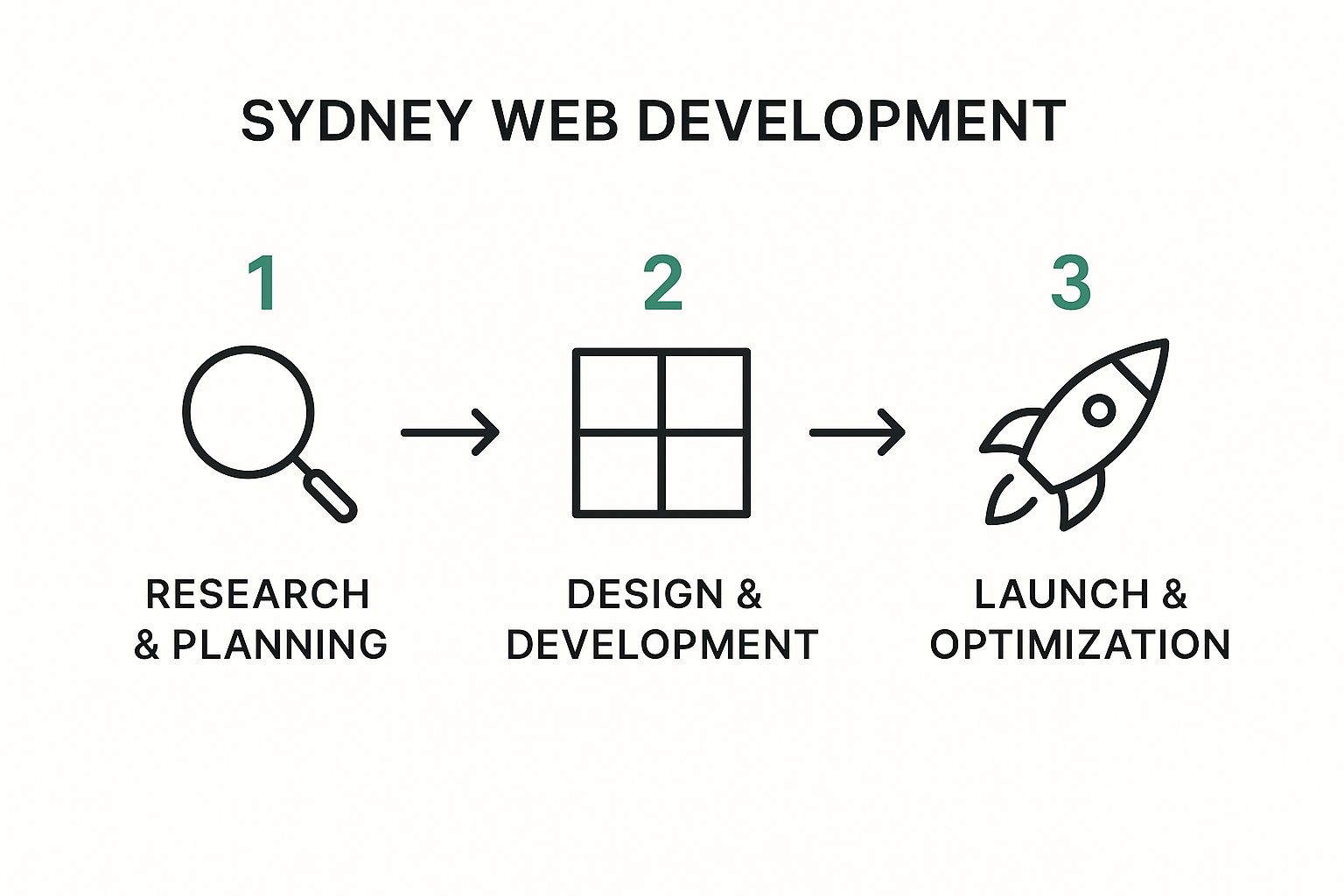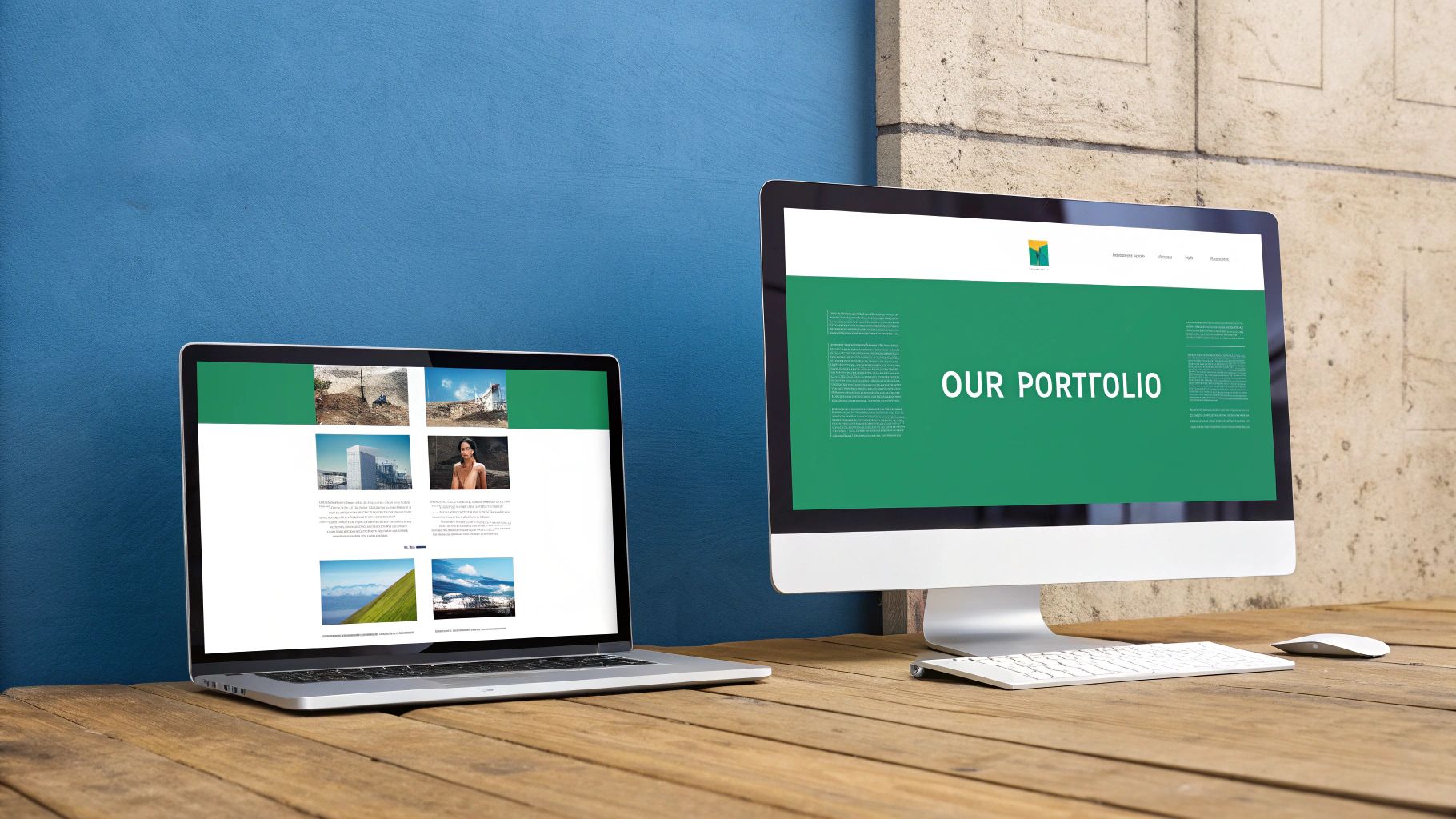Hire a Web Developer Sydney Your Small Business Can Trust
A small business guide to hiring the right web developer Sydney. Learn how to define your project, vet local talent, and make a smart investment.
In a city as competitive as Sydney, finding the right web developer is a game-changer for your small business. It’s what separates a forgettable online brochure from a powerhouse asset that pulls in local leads and drives sales. Your website is your digital storefront, open 24/7, and it’s usually the first impression a potential customer gets of your work.
Your Website Is Your Hardest-Working Employee

Seriously, think about it. Your website never sleeps, never takes a holiday, and never calls in sick. For any small or local business in Sydney, this digital presence is absolutely essential. It’s where people go to check you out after seeing your work van on the road or getting a word-of-mouth referral from a neighbour.
A professionally built site does far more than just list your services—it instantly builds trust. A slow, clunky, or dated website makes people second-guess the quality of your actual work. On the flip side, a modern, fast, and easy-to-use site screams professionalism and reliability, making it that much easier for a customer to pick up the phone and book a job.
Real Scenarios for Sydney Businesses
Let’s get practical. Imagine you’re a plumber based in the Eastern Suburbs. Your customers aren't digging through the Yellow Pages anymore. They’re grabbing their phones and Googling "emergency plumber Bondi." A site that's been properly built and optimised by a local web developer puts you right at the top of those search results, catching those high-intent leads in your exact service area.
Or what about a local cafe in Paddington wanting to offer online ordering? Their website isn't just a pretty menu; it's a vital sales channel. A slick online ordering setup lets them serve more customers during the busy lunch rush and sell to people all over Sydney—turning a local shop into a much bigger business.
Your website is a direct reflection of your business's quality and attention to detail. In a city where first impressions count, a poor online experience can cost you valuable customers before you even know they exist.
Actionable Business Value
At the end of the day, paying for a quality website built by a professional isn't just another business expense. It's a strategic investment with real, measurable returns. A great site helps you:
- Generate qualified leads by pulling in local customers who are actively searching for the services you offer.
- Automate your admin with things like online booking systems, quote request forms, and detailed FAQs that answer customer questions before they even need to call you.
- Build brand credibility and make you stand out from the competition still relying on a basic Facebook page or an outdated website.
This is why working with a web developer in Sydney who understands local business is so important. They’re not just building a website; they’re creating a foundational tool for growth, designed from the ground up to connect with your local customers.
Defining Your Website Goals Before You Hire Anyone

Before you even think about searching for a web developer in Sydney, pause. The most critical part of this whole process happens right now, at your desk, before you speak to a single soul. You need to figure out what you actually want your website to do for your business.
Skipping this step is a classic mistake. It's like telling a builder to start on your house without giving them blueprints. You're guaranteeing confusion, blown-out timelines, and a final invoice that’s much higher than you expected.
A solid plan, or what we call a project brief, gets everyone on the same page from day one. It helps you get clear, comparable quotes from developers and cuts out the frustrating back-and-forth that wastes time and money.
Sydney's business scene is incredibly competitive, and a strong online presence is no longer optional. The city is a hub for digital innovation, and local companies are constantly upping their game online. You can get a better feel for Sydney's web development trends to see why having a clear strategy is so important.
Start with Tangible Business Outcomes
Don't just say, "I need a new website." That’s too vague. Instead, think about the specific business problem you're trying to solve. This simple shift in thinking turns your website from a cost into an investment.
What do you want to see happen once the site is live? Get specific.
- Generate more leads? "I want to get 15 new quote requests through my contact form each month."
- Cut down on admin? "I need an online calendar so clients can book appointments without calling the office."
- Sell online? "I need to sell my products directly to customers and have the inventory update automatically."
- Showcase my work? "I need a professional portfolio to show off my completed projects and build trust with new clients."
When you start the conversation with goals like these, a good developer can immediately start thinking about the right solutions and technologies to get you there.
Prioritise Your Website Features
Alright, now it’s time to brainstorm all the features you think you need. Get it all down on paper. Then, take a red pen and brutally divide that list into two columns: "Must-Haves" and "Nice-to-Haves."
This is probably the single best action you can take to keep your budget and timeline under control. Your must-haves are the core functions the site needs to launch and achieve its main goal. The nice-to-haves are the bells and whistles you can always add later on.
Expert Tip: One of the biggest mistakes small business owners make is trying to build their "forever" website right out of the gate. A smarter approach is to launch with a strong, streamlined version 1.0. Get it live, let it start working for you, and then you can reinvest in a Phase 2 down the track.
Let’s imagine a landscaping business in the Northern Beaches. Their must-haves are probably a stunning gallery of past work, a clear list of services, and a contact form that’s impossible to miss. A nice-to-have could be a blog with gardening tips. It’s a great idea for SEO, but it isn’t critical for getting the site launched and generating leads now.
This simple act of prioritising keeps your project focused and your budget realistic, setting the stage for a great working relationship with whichever Sydney web developer you end up hiring.
To help you with this process, here's a quick checklist you can use to sort out your own must-haves and nice-to-haves.
Website Feature Checklist for Small Businesses
| Feature Type | Essential (Must-Have) | Advanced (Nice-to-Have) |
|---|---|---|
| Core Pages | Homepage, About Us, Services/Products, Contact Us | Blog/Articles, Case Studies, FAQ Page, Team Bios |
| Lead Generation | Simple Contact Form, Click-to-Call Phone Number | Pop-up Forms, Live Chat Integration, Online Booking System |
| Content | High-Quality Photos of Your Work, Professionally Written Copy | Professional Video Content, Downloadable Guides/eBooks |
| eCommerce | Basic Product Pages, Secure Checkout, Payment Gateway | Customer Accounts, Product Reviews, Wishlist Functionality |
| Technical | Mobile-Responsive Design, Fast Loading Speed, Basic SEO | Advanced SEO Tools, CRM Integration, Multilingual Support |
This checklist isn't exhaustive, but it’s a solid starting point for creating a project brief that will help you get accurate quotes and find the right developer for the job.
Finding and Vetting Sydney Web Developers
Alright, you’ve got your project brief sorted. Now for the interesting part—finding the right local talent to bring it to life.
Typing "web developer sydney" into Google is one way to start, but you’ll be swamped with thousands of results, mostly sponsored ads. The best developers for small businesses often aren't the ones paying the most to be at the top. You need to dig a little deeper.
Platforms like Clutch or Upwork are solid places to start your search, but don't overlook local business groups. Your local Chamber of Commerce or a Facebook group for Sydney small business owners can be goldmines for finding developers who genuinely understand the local market. These platforms give you access to portfolios and, more importantly, real recommendations from other business owners like you.
This matters because finding the right person isn't easy. Right now in Sydney, demand for skilled developers is through the roof. Over 60% of Australian tech companies say they struggle to find the talent they need. The shortage is particularly bad for advanced front-end and full-stack roles, which means the best people get snapped up quickly. You can read more about this on jploft.com.
How To Analyse A Developer's Portfolio
Once you have a shortlist, it's time to put on your detective hat. A portfolio is more than just a gallery of pretty websites; it’s proof of their skills and experience. It’s easy to be wowed by fancy animations, but you need to look closer.
Ask yourself a few critical questions as you browse their work:
- Is their experience relevant to my business? If you run a plumbing business, a portfolio filled with fashion e-commerce sites might not be the best fit. Look for examples of work they've done for other local service businesses or, even better, other tradies.
- Do the websites actually work well? Don't just look—click around. Open a few of their past projects on your phone. Do they load quickly? Is it easy to find their phone number and contact form? Test out the key functions to make sure everything is seamless.
- Are they proud of their clients' results? A good developer will happily show you who they’ve worked with. Look for clear case studies and testimonials from other Sydney businesses that talk about the results the website achieved, not just how it looks.
A professional web development project isn't a chaotic mess; it follows a clear, structured path from the initial chat to a successful launch and beyond.

This process shows that building a great website is a collaborative journey, not a one-off task. A structured approach ensures your goals are met and nothing important gets missed.
Knowing The Right Questions To Ask
After you’ve done your homework on their past work and have a couple of favourites, it's time to make contact. This is your chance to see how they communicate and if they truly understand what your small business needs. This is just as important as their technical skill.
A good developer won't be intimidated by direct, specific questions. They'll see it as a chance to demonstrate their expertise and prove they're the right person to help your business.
Instead of vague questions, get right to the point with actionable questions:
- "Could you show me a website you built for another service business in the Inner West?"
- "What was the main business goal for that project, and how did your work help them achieve it?"
- "How do you handle project communication? Will I have a single point of contact and get regular updates?"
Finding a developer who gets your industry is a massive advantage, especially for trade-based businesses. For more tailored advice, check out our guide on web design for tradies. Having a partner who speaks your language and understands your customers makes the entire process smoother and ultimately delivers a much better website.
How to Compare Web Development Quotes

Okay, you’ve done the legwork and now a few proposals from different Sydney web developers are sitting in your inbox. Getting the quotes is often the easy part—the real challenge is figuring out what they actually mean so you can compare them fairly. Trust me, it’s rarely an apples-to-apples situation.
It's tempting to gravitate toward the cheapest option. We all want a good deal. But a low price tag can quickly turn into your most expensive mistake, hiding a vague project scope, excluding essentials like basic SEO, or relying on a cheap template that makes you look like every other business out there.
The goal isn't just to find the lowest price. It’s to find the absolute best value for your investment.
Look Beyond the Final Price Tag
A professional quote is much more than a single number at the bottom of the page. It should be a clear, itemised breakdown of the entire project, showing you exactly where your money is going. This transparency is crucial for comparing what's actually included in each offer.
Here are the key stages a good proposal will detail:
- Discovery & Strategy: This is the planning phase—think wireframing, mapping out how a customer will use the site, and defining goals. A developer who invests time here is focused on building a website that will actually grow your business, not just look pretty.
- Design Phase: This covers all the visual elements. It’s about creating mockups, choosing colour palettes, and establishing the overall look and feel that reflects your brand.
- Development Phase: This is where the code happens. The design gets turned into a functional, live website. The quote should clearly state if it’s a custom build from scratch or a site built on a pre-existing theme.
- Content Implementation: A crucial, often overlooked detail. The proposal must specify who is responsible for adding your text, images, and other content to the new site. Never assume it's included.
The True Cost of a Web Developer in Sydney
It helps to understand what’s happening in the local market. Australia's tech sector is on a serious upward trend, with IT spending projected to soar past AUD 146 billion in 2025. In this environment, skilled developers are in high demand.
With many experienced software engineers earning salaries around AUD 110,000, their rates naturally reflect that expertise. A higher hourly rate often means you’re hiring a more seasoned web developer in Sydney who can work faster and deliver a much higher quality result.
I’ve seen it time and time again: a higher hourly rate from an experienced developer is often a better deal than a lower rate from a junior one. An expert might solve a problem in one hour that takes a novice five, ultimately saving you money and a lot of headaches.
Red Flags to Watch Out For
After reviewing hundreds of proposals over the years, I can tell you that some quotes will immediately raise red flags. Spotting them early will save you from a project that goes completely off the rails.
Here are a few common warning signs to be cautious of:
- Vague Scope: Be very wary of a quote that just says "5-page website" without detailing what those pages are or what features they’ll have. This is a recipe for scope creep and unexpected bills down the line.
- Unrealistic Timelines: Building a quality, custom website takes time. Anyone promising to deliver a complex site in under a week is almost certainly cutting corners somewhere.
- No Mention of Ongoing Costs: A website isn't a "set it and forget it" asset. It needs hosting, maintenance, and security updates. A trustworthy developer will be upfront about these ongoing costs so you can budget for them.
Digging into these details is the key to making a smart financial decision. A good developer will walk you through these costs and help you understand what's required to keep your online presence strong.
Steering Your Project to the Finish Line (And Beyond)
You’ve found your developer—fantastic! But that’s just the first major milestone. The way you collaborate and manage the project from here on out is just as critical as the technical skills you hired for. The best website builds are always a true partnership, not just a transaction.
This partnership is built on clear communication. Your developer can’t read your mind, so set up a simple system to keep everyone on the same page. A weekly 15-minute check-in call or a shared project board can work wonders. Consistent, open dialogue is what stops tiny misunderstandings from snowballing into big, costly problems later.
How to Give Feedback That Actually Helps
At some point, your developer will send over a design draft or a staging link for you to review. Your feedback is what keeps the project moving, so being prompt is essential. If you sit on it for a week, you've just pushed your launch date back by a week.
Even more important is how you give that feedback. It needs to be specific and constructive.
Saying, "I'm not sure about the colour," doesn't give them much to work with. A better approach would be, "The heading text feels a bit washed out. Could we try our darker brand blue to make it pop more against the white background?" See the difference? One is a vague feeling; the other is a clear, actionable instruction.
I always tell my clients: You're the expert on your business, and I'm the expert on the web. A great website happens when we bring both of those strengths to the table. Your input and clear feedback are just as vital as my code.
Your Website Doesn't End at "Go-Live"
Launching your website isn't the end of the journey; it's the beginning. I've seen too many business owners invest in a beautiful new site only to let it gather dust. Think of your website as a living, breathing part of your business—it needs ongoing care to perform at its best and protect your investment.
Security is a huge part of this. The single biggest reason websites get hacked is outdated software. Not updating your site is like leaving the keys in the ignition of your work ute overnight. It's an open invitation for trouble.
Once you're live, these are the areas you absolutely need to stay on top of:
- Security & Updates: This is non-negotiable. Your platform (like WordPress) and all its plugins need regular updates to patch up security holes.
- Performance Checks: How fast does your site load? A slow website is a customer-repellent and a red flag for Google. Keeping it snappy is crucial for keeping those Sydney customers on your site.
- Basic SEO: When you add a new project gallery or service page, make sure it has a proper title and description. Weaving in keywords your local customers are searching for is a must.
It’s just like getting your tools or vehicle serviced. A little regular maintenance prevents major breakdowns. Many business owners find it worthwhile to work with a web developer in Sydney who offers an ongoing care plan. It’s a smart way to ensure your most important digital asset stays secure, fast, and effective long after launch day.
Got Questions About Hiring a Web Developer?
You're not alone. When Sydney business owners start looking for a web developer, a few key questions always come up. Getting straight answers is the best way to feel confident you're making the right move for your business.
Let's clear up some of the most common ones we hear.
How Much Should I Budget for a Small Business Website in Sydney?
This is usually the first question on everyone's mind, and the honest answer is: it really depends. For a straightforward, professional website for a local service business—designed to showcase your work and get people to contact you—you're likely looking at a few thousand dollars to get started.
If your needs are more complex, like an e-commerce store with many products or custom booking features, the price tag will climb. A project like that could easily run into ten thousand or more. Most Sydney developers charge between AUD $100 and $180 per hour, so the best way to get a real number is to have a clear project brief and ask for a detailed, itemised quote.
Should I Just Use a Website Builder Instead of Hiring a Developer?
Look, platforms like Squarespace or Wix have their place. If you're just starting out and your budget is paper-thin, they can get you a basic presence online quickly. No one's going to argue with that.
But if you're serious about growing your business, a professionally built website is a smarter long-term play. A good local developer builds a site that can grow with you, integrating features that actually help you generate leads. More importantly, they can build it with local SEO in mind from day one, which is absolutely critical for getting found by customers in your target Sydney suburbs. A generic template just can't compete on that front.
Here's an analogy I like to use: a DIY builder is like a flat-pack shed from Bunnings. A professionally built website is like a custom-designed workshop. Both give you a roof, but only one is purpose-built to help your specific business run efficiently and expand.
What's the Difference Between a Web Designer and a Developer Anyway?
This one trips up a lot of people. Think of it this way:
- A web designer is the architect. They're focused on the visuals and the user experience (UX)—the layout, branding, colours, and how a customer will actually feel using the site. They make it look professional and easy to navigate.
- A web developer is the builder. They take the designer's blueprint and write the code that brings it to life and makes it all work, from the contact form to the online booking system.
The good news is that many skilled freelancers and small agencies in Sydney have both skill sets under one roof. This is a huge plus for a small business because it gives you one point of contact and ensures the design and function are perfectly in sync. It's especially important for local service businesses like tradies, who need a site that both looks professional and brings in leads. For more on that, check out our guide on SEO for tradies.
Ready to stop worrying about your website and start getting more customers? The team at SiteStarter builds high-quality, lead-generating websites for Sydney businesses. We handle all the technical details so you can focus on what you do best. Get in touch with us today at https://sitestarter.co.